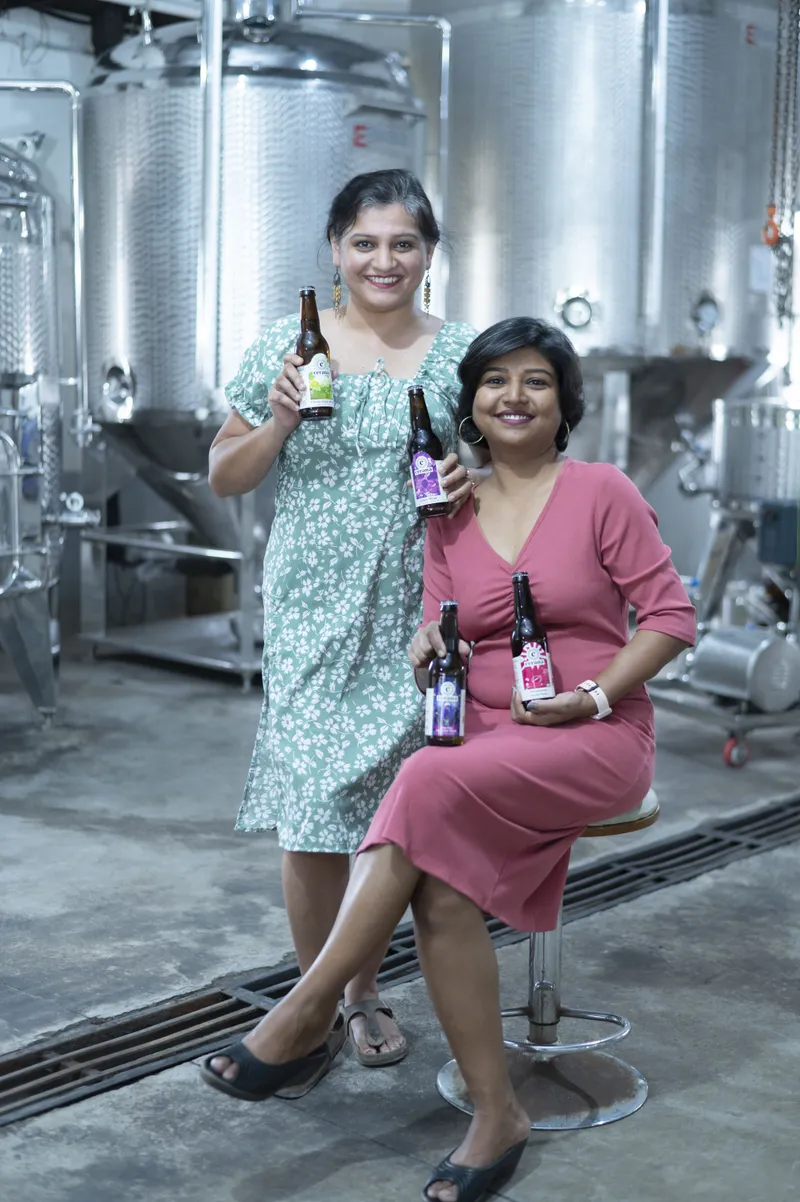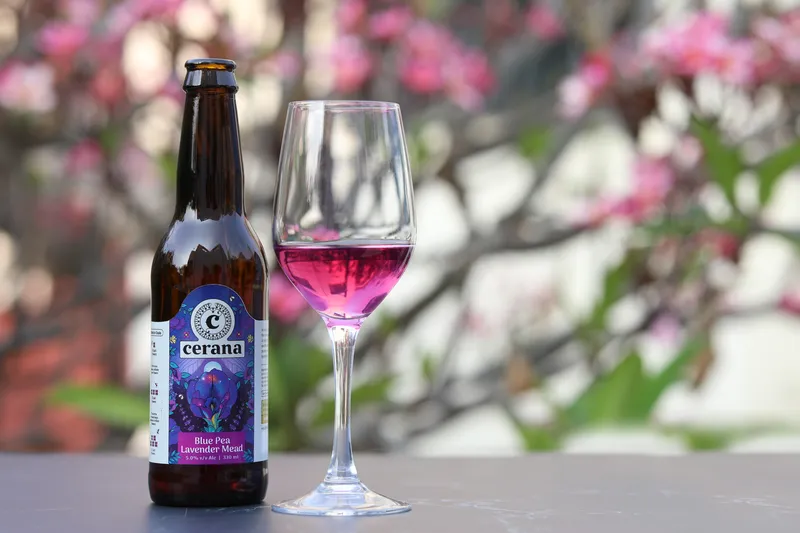From beehives to bottles: Cheers to the two women who run one of India’s first meaderies
Nashik-based Cerana Meads, the brainchild of Yoginee Budhkar and Ashwini Deore, crafts an alcoholic beverage from honey. It represents the coming together of their love for nature, fascination with honeybees, and appreciation of alcohol.
Twelve years ago, when Yoginee Budhkar learnt about mead–an alcoholic beverage made by fermenting honey mixed with water and spices–from a UK-based professor, she was intrigued.
Driven by unceasing curiosity, Budhkar began her search for the beverage locally, alongside her pursuit of a doctorate in biotechnology. However, she was unable to find the drink locally; so she began her own experiments to make some herself.
Although her journey started as a mere passion, it eventually turned into something more.
In 2014, Budhkar shared the idea of setting up a meadery with her friend Ashwini Deore, a post-doctorate in bioprocess technology. In an instant, Deore decided to join Budhkar in her venture.
After five years of research and development, was established in 2019.
“Cerana Meads is a marriage of our love for nature, fascination with honeybees, and our appreciation of alcohol,” Budhkar tells HerStory.
Cerana Meads, she says, is the second company in India to get a licence for mead production.
How it all began

Yoginee Budhkar (left) and Ashwini Deore (right)
Budhkar and Deore had always been passionate about science and nature. Both finished their doctorate from the Food Engineering and Technology Department at the Institute of Chemical Technology in Mumbai. During their college days, it was their shared interest in wine and nature that brought them together.
Budhkar recalls her meeting with an investor at a party, who encouraged her to start making mead for commercial purposes as there was no big player in India. The idea struck her so deeply that she could not sleep that night.
Later, she called Deore, who at that time was finishing her post-doctorate degree in Canada. The moment she heard the idea, Deore made up her mind to come back to India and start a venture together with Budhkar.
“From being friends to co-founders, our bond has grown stronger,” says Budhkar.
In 2014, the two friends started their research and development for making mead. They made several batches of mead, exploring different fruits and spices. Three years later, Budhkar even went to California to study advanced mead making at UC Davis.
Back then, the Maharashtra state did not permit commercial fermentation of honey. So, the duo tried to persuade the excise department to amend the laws to enable the commercial fermentation of honey. Their efforts eventually paid off, and they obtained an approval from the state’s excise ministry in Mumbai in July 2017.
Following this, they took up a rental space in the Sinnar region of Nashik, Maharashtra. In December 2019, they obtained the final licence to produce mead.
"We started building our product stock in January 2020, but COVID-19 hit and slowed us down. Things improved in June 2020 when the government allowed retail stores to reopen,” says Budhkar.
At Cerana, Budhkar takes care of business development while Deore handles excise and meadery operations. Both of them manage the mead making together.
Crafting alcohol from honey
Cerana offers a selection of meads with varying alcohol content: Pomegranate Vanilla, Jamun, Chenin Blanc, and Blue Pea Lavender, which have an alcohol content of less than 10% and come in 330-ml pints. It also offers Pinot Noir and Yule Spice, which come in 750-ml bottles and have 11.5% and 12% alcohol content, respectively.
The company also produces other kinds of mead: melomel from fruits such as berries, apples, and peaches; pyment made with grapes or grape juice; and metheglin, which is infused with spices and herbs like cinnamon, clove and ginger.
The price of the products ranges from Rs 199 to Rs 810, depending on the size of the bottle. The company has produced 25,000 litres of mead so far.

Blue Pea Lavender Mead
Cerana Meads uses four kinds of honey: mustard honey procured from Rajasthan, litchi honey from Bihar, multi-floral honey from Himachal, and jamun honey from the Satpura region along the Maharashtra-Madhya Pradesh border.
After the honey is procured, a quality analysis is done at the production unit in Nashik, which is spread across 3,500 sq feet. Then the honey is mixed with water and kept aside for fermentation.
“We have SOPs (standard operating procedure) for different types of meads and the process differs accordingly,” says Deore.
Once the fermentation process is complete, the mead is clarified, stabilised, filtered, carbonated, if needed, and then carefully bottled.
Deore notes that meads with a higher alcohol content are non-carbonated, while those with lower alcohol content are carbonated.
Budhkar points out that honey is extracted only from the ‘super chamber’ of the bee boxes, where bees store surplus honey.
"In the super chamber, honeybees meticulously use certain techniques to reduce the honey’s moisture content, sealing it with wax. Our meads are crafted from sealed comb honey, which is not subjected to any artificial moisture removal process,” she says.
She explains that sealed comb honey contains lower moisture levels and hence an extended shelf life. If it isn’t sealed, the honey is premature and requires artificial removal of moisture, which can diminish the subtleties of flavour and affect natural taste.
“Taking honey from the brood portion of the bee box could also disrupt the bees,” she adds.
To ensure honey is harvested from the surplus portion of the hive, the duo either supervises the extraction process in person or monitors it via video.
They believe traditional wine and beer production often involves the use of agricultural land, treated with chemicals, which can have detrimental effects on the environment. On the other hand, mead making does not inflict any harm on the bees and the surrounding environment, they say.
“Mead making relies primarily on honey as its raw material, with the process designed to ensure no harm is inflicted on the bee population or the environment. Additionally, we use locally sourced ingredients in our meads, which are gluten free and without any synthetic additives,” says Budhkar.
The startup has a team of nine people including the founders. The D2C brand sells its products through alcohol outlets in Pune, Nashik and Mumbai in Maharashtra. It also sells honey through its website.
The founders plan to expand their business to Bengaluru, Delhi and Goa and launch new products by next year.

Cerana offers a selection of meads with varying alcohol content: Pomegranate Vanilla, Jamun, Chenin Blanc, and Blue Pea Lavender, Pinot Noir, and Yule Spice. It also produces other kinds of mead: melomel from berries, apples and peaches; pyment from grapes; and metheglin using spices and herbs.
Challenges in the industry
Speaking on the challenges in the industry, Budhkar says alcohol is a highly regulated substance in India and thus approvals take time to come through.
“Navigating compliances is a time-consuming and resource-intensive process for startups like ours,” she says, adding that building a good team for production is another challenge and the staff needs to be trained from scratch.
On the consumer front, there are two distinct issues to be addressed. One involves introducing a whole new category to a market that is habituated to beer, wine and hard liquor. Secondly, the Indian market is largely a price sensitive one.
"For a craft alcohol brand like ours where quality takes precedence over cost of manufacturing, it is a challenge to maintain the balance between quality and price,” says Budhkar.
Talking about their experience as women entrepreneurs, Budhkar says, “It is natural to think that women would find it difficult to find their space and comfort in this industry, as it has largely been male-dominated. However, our firsthand experience has been that this is probably the most gender-neutral industry to work in. We have not had to face any challenge that our male peers haven’t faced themselves.”
“We haven’t faced a bias or suffered any stigma on account of being women in the industry. Additionally, our families have been very supportive of our choices and journey,” she adds.
Edited by Swetha Kannan







